#More people need to read this poem anthology
Text
So, now that Blood of Zeus has also been given its chance to tell the Demeter/Persephone story (and also, similarly, fundamentally misunderstood the themes of the Hymn to Demeter) can we finally, finally talk about Mother Love?
Because I can scream until I'm blue in the face about how modern, popular interpretations of the myth have become so focused on being 'empowering' to women by fixating on giving power to Persephone in her marriage with Hades and, in turn, disparaging Demeter, another woman, - the mother who grieves her lost daughter - that they've some how spun all the way around and gotten back to being misogynistic and reductive, but I feel like talking nebulously about the fact that it's Demeter and Persephone's story and not Hades and Persephone's story never gets the point across hard enough. So:
Anyone who was upset about Demeter's demonisation in Blood of Zeus S2? Read Mother Love. Anyone who is ever upset that retellings of the Homeric Hymn to Demeter constantly demonise, belittle, accuse and insult Demeter and her grief while making excuses to redeem and forgive her daughter's captor? Read Mother Love. Anyone who likes Hades and Persephone as a romantic tale but yearn for complexity outside of arbitrary romantic antagonists impeding the happiness of the couple? Read Mother Love!! Everyone who has even a passing interest in this tale whether it is for the romance, the mother-daughter connections, the themes of grief and loss and eventual comfort and compromise, the wrath of the mother transgressed, the justice that is served due to a mother's insistence in an unjust society, READ MOTHER LOVE!!!
Because it pains me that such a perfect retelling of Demeter and Persephone's story exists, that it focuses on the mother-daughter relationship by comparing it with the poet's own relationship with her mother and it is nearly obscure in the greek mythology community.
#greek mythology#ginger rambles#ginger chats about greek myths#hades and persephone#demeter and persephone#hades#persephone#demeter#poetry#rita dove#More people need to read this poem anthology#blood of zeus#boz#I swear I will not stop in my endeavour to have more people know about the best retelling of Demeter and Persephone's story that exists#I realise I haven't described at all what Mother Love is#I'll make a separate post for that#But I'm so sick of y'all making Demeter a machiavellian supervillain in the story where she loses her daughter and grieves so hard#and forces the justice system to do something about it so she can get her daughter back#READ MOTHER LOVE I BEG YOU
73 notes
·
View notes
Text
Unprintable: Artists Against Authority



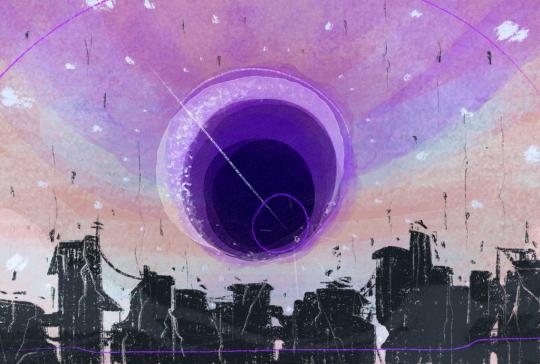
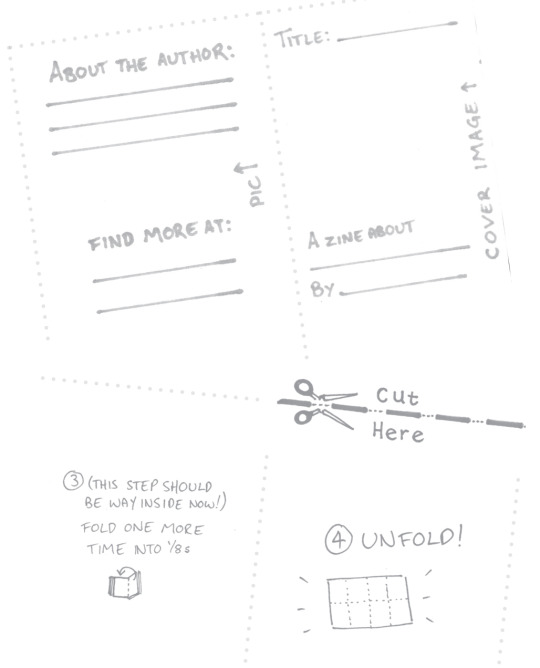
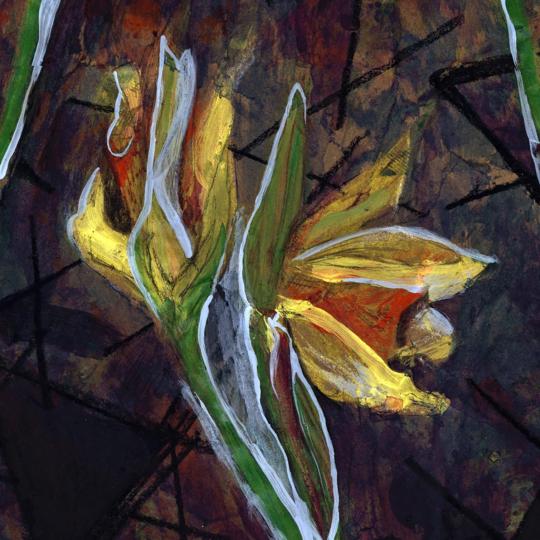
I am absolutely beside myself with excitement to announce the launch of Unprintable.
Unprintable is an online free shop, where original artwork and arts resources are released into the public domain.
Everything listed here is free to use, copy and remix any way you like. You can print off hi-res artwork to decorate your apartment, or to use in your own projects. You can use the writing in your own zines, anthologies or performances. You can put it on a t-shirt. You can read it on the radio. You can paint it on a truck. It's up to you, entirely and forever.
The collection will be updated continuously, on an unfixed schedule, with contributions from a wide range of named and anonymous artists and activists. You can read the FAQ for a full rundown of what Unprintable is and why it exists, but these are the really important parts:
Can I download/print/use the work listed here?
Yes.
Can I use it for [X]?
You can do whatever you want with it forever.
But what if I want to [Y]?
You can do whatever you want with it forever.
Why do this?
A few reasons:
1. We want a space to just share things, no strings attached.
We recognise that copyright is an irrational system that was designed to protect the profit interests of publishing middlemen and IP hoarders. In fact, copyright is often weaponised against the creators it pretends to protect. As long as it exists, we are unlikely to win any other form of protection for our work, and we are profoundly limited from engaging in the kind of communal artistic and storytelling practices that were the norm around the world for thousands of years.
2. Radical art is often unprintable.
Profit motives make people cautious. A lot of print-on-demand or local print shop services will refuse artwork with controversial, sensitive or political content. This is very frustrating when these themes are the focus of so much of our work (and indeed our lives). Rather than waste any more breath trying to explain why a trans artist might want to print the word ‘faggot’, we can give our work away for free. Got a printer? It’s yours.
3. It feels good.
Sharing is joyful. It’s the reason we love making things in the first place. We don’t write poems because we look forward to filleting them for consumption, or layer colours so that we can sell a canvas by the ounce. We have only ever wanted to be able to support ourselves so that we can make, but that relationship is deeply dysfunctional under capitalism. We made these things, and we want you to have them. It doesn’t need to be complicated.
I'll write up some more posts introducing the launch collection soon. In the meantime...be free, enjoy, explore, have fun!
https://free.mortalityplays.com
2K notes
·
View notes
Text
learn!
https://yivo.org/Research
Here’s a list of resources - some about the Shoah directly, some about Jewish civilization, language, food, and culture, many about both in the way that Jewish life is so often about both. I think it’s important for allies to learn about both and that accessing the song and poetry archives can be one of the best ways to engage with the experiences of victims and survivors themselves. Remember that they were people with hopes and dreams and a culture and they were murdered for being Jews and they survived as Jews. Their Judaism was not a sidenote to their humanity. Remember that their grandchildren and great grandchildren still live and they can hear you when you talk about them. Engage with our culture, engage respectfully- read our books, cook our food, listen to our songs. מיר זײַנען דאָ!
129 notes
·
View notes
Text

A MASTERLIST OF ALL THE BOOKS I COULD FIND IN TIM'S BOOKSHELVES
As someone who basically sees Tim Laughlin as my own version of Jesus Christ (I kind of wish I was lying but I have a 'beyond measure' tattoo branding my skin so perhaps I'm entirely serious), I simply needed to know what was on those shelves of his. And this was a hard task to achieve, believe me... but I got much farther than I initially thought I would.
(I've got so much to say about all of these books and how they might string together to create a deeper understanding of Tim as a character but I won't go into it here... maybe in a future post or video essay, who knows).
If you wish to help a girl out and attempt to figure out any of the other books I simply can not crack no matter how I look at the screenshots and mess with the adjustments... here's a folder full of 2k sized screenshots of those shelves.
Before I list the books one by one, I want to make a couple observations:
1) Almost all of the books I was able to pinpoint are non-fiction. The ones that aren't are children's books.
2) Topically, we see an interdisciplinary interest in:
History: from a book on a king in 4BC, to a survey of landholding in England in the 11th century.
Somewhat current historical events: books on World War I and II.
Western Philosophers: specially from the 16th to the 18th century.
Aesthetics: there's at least 2 books on the subject matter, but I couldn't find the second one, sadly.
Spirituality: not only christian/catholic; some of these books touch on Eastern practices such as Buddhism and Hinduism.
Fairy tales / children's books.
Psychology: specially in regards to mysticism and sexuality.
Science and scientific discovery/research.
3) A lot of the history, current events, and spirituality books are autobiographies/memoirs.
4) A lot of books (specially those on sciences and philosophy) tend to be more so anthologies or overviews on a subject matter rather than a book written by one specific author on one very concrete topic.
Overall, this all reflects very well an idea Jonathan Bailey himself expressed in a brilliant interview you can watch here if you haven't yet:
"Tim has buddhist flags in his 1980s flat in San Francisco, he has crystals, he is someone who is always seeking other ways to understand human experience. Which is probably tiring for him. Throughout the decades, he sort of appears as completely different people. At the crux of it there's this extreme grinding, contrasting, aggressive duality between feeling lovable and not feeling lovable. There's such shame in Tim. But it's the push and the pull which keeps him alive.”
This desire to understand human psychology, spirituality, and the ways of the universe through as many diverse lenses as possible, as well as a predilection for non-fiction, expresses very much to me that insatiable thirst for truth that defines his character so strongly.
OKAY, THAT BEING SAID. Here's the list in chronological order of publication.
PS. if you decided to click on any of the following titles it'd definitely not take you to a google drive link of the pdf file where you could download and read these books for yourself. Because that would be illegal and wrong.

Journeys through Bookland by Charles H. Sylvester (1901?) (1922 Edition)
I don't know which specific volume he owns, sorry, I tried my best but the number is not discernible (hell, the title barely is). If anyone wants the download link to these hmu because I'm not about to individually download all 10 right now.
10 volumes of poems, myths, Bible stories, fairy tales, and excerpts from children's novels, as well as a guide to the series. It has been lauded as ‘a new and original plan for reading, applied to the world’s best literature for children.’
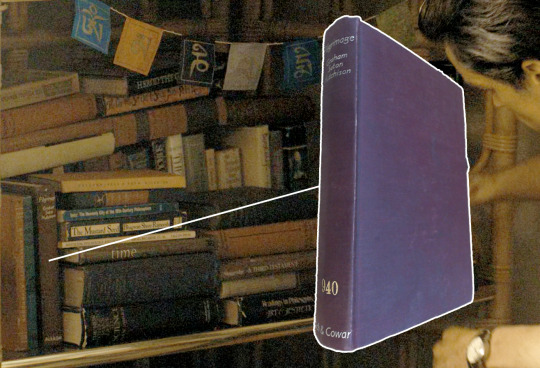
Pilgrimage by Graham Seton Hutchison (1936)
This book provides a view of the battlefields of WW I through the eyes of the average fighting man.
One curious thing about this book is that it's author, a British First World War army officer and military theorist, went on to become a fascist activist later in his life. Straight from Wikipedia:
"Seton Hutchison became a celebrated figure in military circles for his tactical innovations during the First World War but would later become associated with a series of fringe fascist movements which failed to capture much support even by the standards of the far right in Britain in the interbellum period." He made a contribution to First World War fiction with his espionage novel, The W Plan."
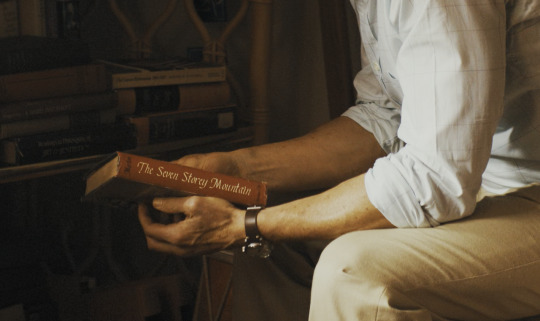
The Seven Storey Mountain by Thomas Merton (1948)
The Seven Storey Mountain tells of the growing restlessness of a brilliant and passionate young man, who at the age of twenty-six, takes vows in one of the most demanding Catholic orders—the Trappist monks. At the Abbey of Gethsemani, "the four walls of my new freedom," Thomas Merton struggles to withdraw from the world, but only after he has fully immersed himself in it. At the abbey, he wrote this extraordinary testament, a unique spiritual autobiography that has been recognized as one of the most influential religious works of our time. Translated into more than twenty languages, it has touched millions of lives.
This book requires no introduction. It's the one he keeps the Fire Island's postcard in and the one we see him re-reading in episode 8 after Hawk brings it to the hospital with him at the end of episode 7.
Just a little detail I noticed:
Apparently he liked the book so much he visited Gethsemani, which was the home of its author all the way up till 1968.

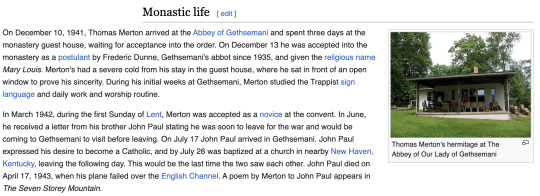
For all we know, he might have even met its author!

Sexual Behavior in the Human Male by Alfred Charles Kinsey, Wardell B. Pomeroy (1948)
When published in 1948 this volume encountered a storm of condemnation and acclaim. It is, however, a milestone on the path toward a scientific approach to the understanding of human sexual behavior. Dr. Alfred C. Kinsey and his fellow researchers sought to accumulate an objective body of facts regarding sex. They employed first hand interviews to gather this data. This volume is based upon histories of approximately 5,300 males which were collected during a fifteen year period. This text describes the methodology, sampling, coding, interviewing, statistical analyses, and then examines factors and sources of sexual outlet.
Yes, Charles Kinsey is indeed behind the Kinsey scale that has done so much for the LGBTQ+ community.

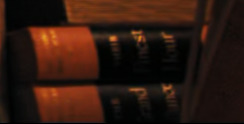
Their Finest Hour (1949), The Grand Alliance (1950), and Closing the Ring (1951) by Winston Churchill
Winston Churchill's six-volume history of the cataclysm that swept the world remains the definitive history of the Second World War. Lucid, dramatic, remarkable both for its breadth and sweep and for its sense of personal involvement, it is universally acknowledged as a magnificent reconstruction and is an enduring, compelling work that led to his being awarded the Nobel Prize for literature in 1953.
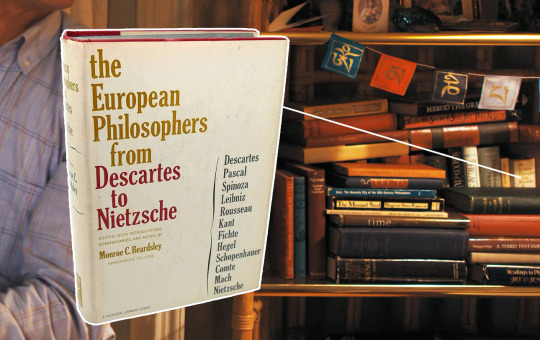
The European Philosophers from Descartes to Nietzsche by Monroe C. Beardsley (1960)
In so far as we reflect upon ourselves and our world, and what we are doing in it, says the editor of this anthology, we are all philosophers. And therefore we are very much concerned with what the twelve men represented in this book--the major philosophers on the Continent of Europe--have to say to us, to help us build our own philosophy, to think things out in our own way. For the issues that we face today are partly determined by the work of thinkers of earlier generations, and no other time is more important to the development of Western thought than is the 250-year period covered by this anthology.
Monroe. C. Beardsley, Professor of Philosophy at Swarthmore College, has chosen major works, or large selections from them, by each man, with supplementary passages to amplify or clarify important points. These include: Descartes - Discourse on Method (Descartes), Thoughts (Pascal), The Nature of Evil (Spinoza), The Relation Between Soul and Body (Leibniz), The Social Construct (Rousseau), Critique of Pure Reason (Kant), The Vocation of Man (Fichte), Introducciton to the Philosophy of History (Hegel), The World as Will and Idea (Schopenhauer), A General View of Positivism (Comte), The Analysis of Sensations and the Relation of the Physical to the Psychical (Mach), Beyond Good and Evil (Nietzsche).
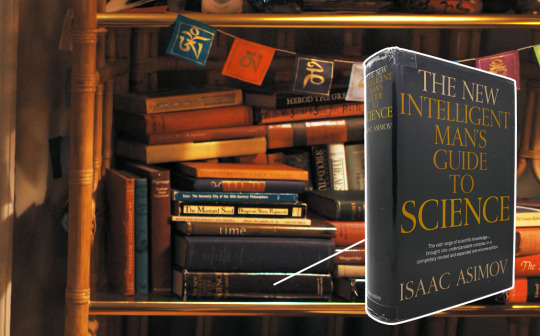
The New Intelligent Man's Guide to Science by Isaac Asimov (1965)
Asimov tells the stories behind the science: the men and women who made the important discoveries and how they did it. Ranging from Galilei, Achimedes, Newton and Einstein, he takes the most complex concepts and explains it in such a way that a first-time reader on the subject feels confident on his/her understanding.
Assists today's readers in keeping abreast of all recent discoveries and advances in physics, the biological sciences, astronomy, computer technology, artificial intelligence, robotics, and other sciences.
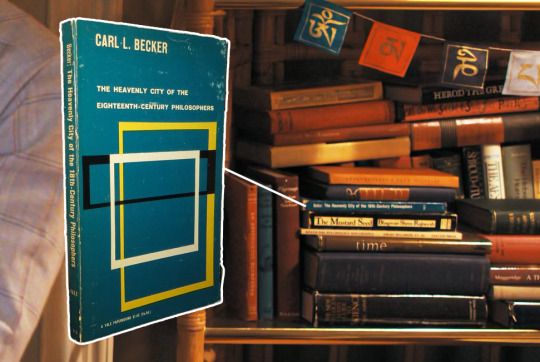
The Heavenly City of the 18th Philosophers by Carl L. Becker (1932) (1962 reprint)
Here a distinguished American historian challenges the belief that the eighteenth century was essentially modern in its temper. In crystalline prose Carl Becker demonstrates that the period commonly described as the Age of Reason was, in fact, very far from that; that Voltaire, Hume, Diderot, and Locke were living in a medieval world, and that these philosophers “demolished the Heavenly City of St. Augustine only to rebuild it with more up-to-date materials.” In a new foreword, Johnson Kent Wright looks at the book’s continuing relevance within the context of current discussion about the Enlightenment.
I find the particular choice of adding this book very curious and on brand, since it explores the idea that philosophers of the Enlightenment very much resembled religious dogma/faith in their structure and purpose. Just... A+ of the props department to not just add any kind of book on philosophy anthology.

Herod The Great by Michael Grant (1971)
The Herod of popular tradition is the tyrannical King of Judaea who ordered the Massacre of the Innocents and died a terrible death in 4 BC as the judgment of God. But this biography paints a much more complex picture of this contemporary of Mark Antony, Cleopatra, and the Emperor Augustus. Herod devoted his life to the task of keeping the Jews prosperous and racially intact. To judge by the two disastrous Jewish rebellions that occurred within a hundred and fifty years of his death -- those the Jews called the First and Second Roman Wars -- he was not, in the long run, completely successful. For forty years Herod walked the most precarious of political tightropes. For he had to be enough of a Jew to retain control of his Jewish subjects, and enough of a pro-Roman to preserve the confidence of Rome, within whose territory his kingdom fell. For more than a quarter of a century he was one of the chief bulwarks of Augustus' empire in the east. He made Judaea a large and prosperous country. He founded cities and built public works on a scale never seen before: of these, recently excavated Masada is a spectacular example. And he did all this in spite of a continuous undercurrent of protest and underground resistance. The numerous illustrations presents portraits and coins, buildings and articles of everyday use, landscapes and fortresses, and subsequent generations' interpretations of the more famous events, actual and mythical, of Herod's career.
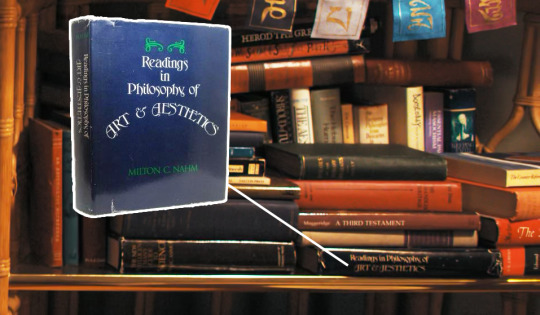
Readings in the Philosophy of Art and Aesthetics compiled by Milton Charles Nahm (1975)
A college level comprehensive anthology of essays written on the arts and the field of aesthetic philosophy.

The Mustard Seed: Discourses on the Sayings of Jesus Taken from the Gospel According to Thomas by Bhagwan Shree Rajneesh (1975)
This timely book explores the wisdom of the Gnostic Jesus, who challenges our preconceptions about the world and ourselves. Based on the Gospel of Thomas, the book recounts the missing years in Jesus’ life and his time in Egypt and India, learning from Egyptian secret societies, then Buddhist schools, then Hindu Vedanta. Each of Jesus' original sayings is the "seed" for a chapter of the book; each examines one aspect of life — birth, death, love, fear, anger, and more — counterpointed by Osho’s penetrating comments and responses to questions from his audience.
(You don't know how fulfilling it was to find some of these books and just sit there like "oh my god, yessss, he'd SO read that".)
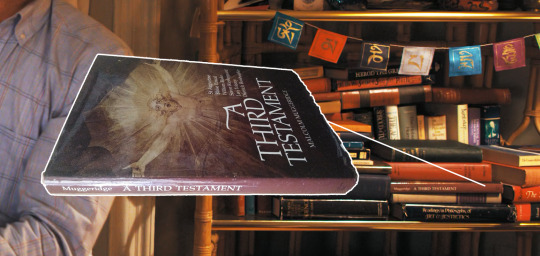
A Third Testament by Malcolm Muggeridge (1976)
A modern pilgrim explores the spiritual wanderings of Augustine, Pascal, Blake, Kierkegaard, Dostoevsky, Tolstoy, and Bonhoeffer. A Third Testament brings to life seven men whose names are familiar enough, but whose iconoclastic spiritual wanderings make for unforgettable reading. Muggeridge's concise biographies are an accessible and manageable introduction to these spiritual giants who carried on the testament to the reality of God begun in the Old and New Testaments.
- St. Augustine, a headstrong young hedonist and speechwriter who turned his back on money and prestige in order to serve Christ
- Blaise Pascal, a brilliant mathematician who pursued scientific knowledge but warned people against thinking they could live without God
- William Blake, a magnificent artist-poet who pled passionately for the life of the spirit and warned of the blight that materialism would usher in
- Soren Kierkegaard, a renegade philosopher who spent most of his life at odds with the church, and insisted that every person must find his own way to God
- Fyodor Dostoevsky, a debt-ridden writer and sometime prisoner who found, in the midst of squalor and political turmoil, the still small voice of God
- Leo Tolstoy, a grand old novelist who swung between idealism and depression, loneliness and fame and a duel awareness of his sinfulness and God s grace
- Dietrich Bonhoeffer, a pastor whose writings and agonized involvement in a plot to kill Hitler cost him his life, but continue to inspire millions
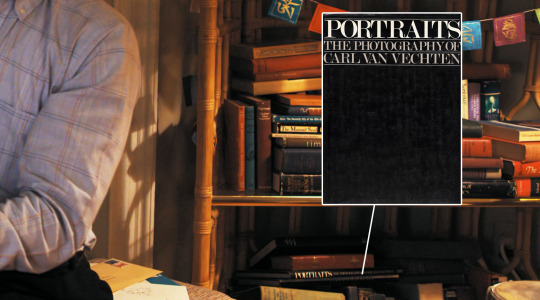
Portraits: The photography of Carl Van Vechten (1978)
Can't find a file but you can borrow it from archive.com in the link provided.
During his career as a photographer, Carl Van Vechten’s subjects, many of whom were his friends and social acquaintances, included dancers, actors, writers, artists, activists, singers, costumiers, photographers, social critics, educators, journalists, and aesthetes. [...] As a promoter of literary talent and a critic of dance, theater, and opera, Carl Van Vechten was as interested in the cultural margin as he was in the day’s most acclaimed and successful people. His diverse subjects give a sense of both Carl Van Vechten’s interests and his considerable role in defining the cultural landscape of the twentieth century; among his many sitters one finds the leading lights of the Harlem Renaissance, the premier actors and writers of the American stage, the world’s greatest opera stars and ballerinas, the most important and influential writers of the day, among many others.
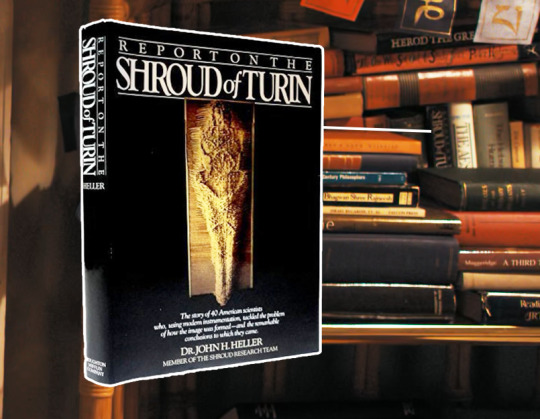
Report of the Shroud of Turin by John H Heller (1983)
Heller, while a man of science, was nevertheless a devout man (Southern Baptist). He viewed his task concerning The Shroud with great scepticism; there have been far too many hoaxes in the world of religion. The book describes in great detail the events leading up to the team's conviction that the Shroud was genuine; last - not least - being Heller and Adler's verification of "heme" (blood) and the inexplicable "burned image" of the crucified man. Although carbon dating indicates that the image is not 2000 years old and that the cloth is from the Middle Ages, there is not enough evidence to disprove Heller's assertion that the Shroud is indeed genuine.
Context for those who may not know (though I doubt it's necessary): The shroud of Turin "is a length of linen cloth that bears a faint image of the front and back of a man. It has been venerated for centuries, especially by members of the Catholic Church, as the actual burial shroud used to wrap the body of Jesus of Nazareth after his crucifixion, and upon which Jesus's bodily image is miraculously imprinted."
It is a very controversial subject matter and I definitely don't know that from going to an Opus Dei school since the day I was born till the day I graduated high school.

Mysticism, Psychology and Oedipus by Israel Regardie (1985)
I've tried my hardest but despite many Israel Regardie books being on the world wide web, I can't find a copy of this specific one.
Mysticism, Psychology and Oedipus, from the Small Gems series is one of these mysterious alchemys which Regardie and Spiegelman crafted for the serious student of mysticism. Mysticism, Psychology and Oedipus by Dr. Israel Regardie and his friend, world renowned Jungian Psychologist, J. Marvin Spiegelman, Ph.D. was created to reach the serious student at the intersecting paths of magic, mysticism and psychology. While each area of study overlaps they also maintain their own individual paths of truth. One of Regardie’s greatest gifts was his rare ability to combine these difficult and diverse subjects and make them understandable.
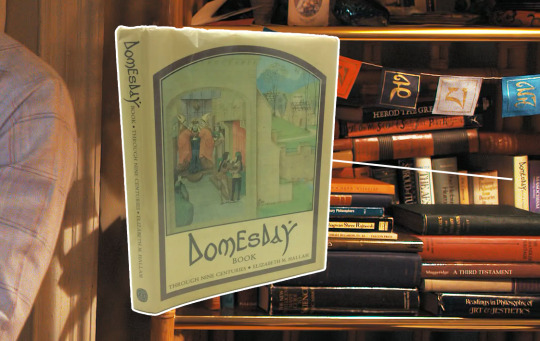
Domesday Book Through Nine Centuries by Elizabeth M. Hallam (1986)
In 1086 a great survey of landholding in England was carried out on the orders of William the Conqueror, and its results were recorded in the two volumes, which, within less than a century, were to acquire the name of Domesday, or the Book of Judgment 'because its decisions, like those of the last Judgment, are unalterable'. This detailed survey of the kingdom, unprecedented at that time in its scope, gives us an extraordinarily vivid impression of the life of the eleventh century.
The following two are a fuck up on the props department part because they were published after 1987 but we'll forgive them because they were not expecting for me to do all this to figure out the titles of these books, I'm sure:
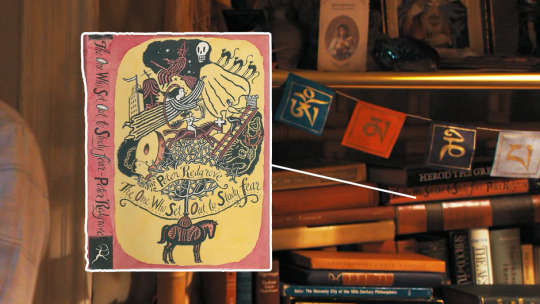
The One Who Set Out to Study Fear by Peter Redgrove (1989)
This book barely exists physically, rest assured it does not exist online... LOL.
The author of The Wise Wound presents here a re-telling of Grimm's famous fairy tales, written in a manner and spirit more suited to the present day. Each story is rooted in the original, but cast in an energetic style that is both disrespectful and humorous.
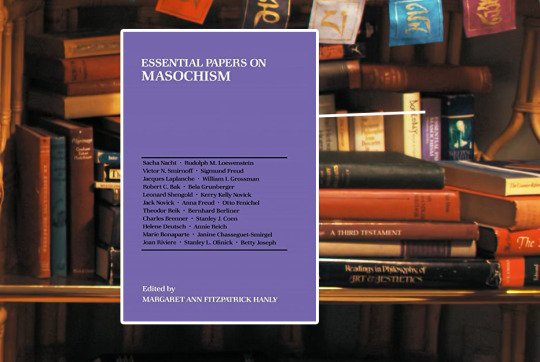
Essential Papers on Masochism by Margaret Ann Fitzpatrick Hanly (1995)
The contested psychoanalytic concept of masochism has served to open up pathways into less-explored regions of the human mind and behavior. Here, rituals of pain and sexual abusiveness prevail, and sometimes gruesome details of unconscious fantasies are constructed out of psychological pain, desperate need, and sexually excited, self- destructive violence.
In this significant addition to the "Essential Papers in Psychoanalysis" series, Margaret Ann Fitzpatrick Hanly presents an anthology of the most outstanding writings in the psychoanalytic study of masochism. In bringing these essays together, Dr. Fitzpatrick Hanly expertly combines classic and contemporary theories by the most respected scholars in the field to create a varied and integrated volume.
This collection features papers by S. Nacht, R. Loewenstein, Victor Smirnoff, Sigmund Freud, Jacques Laplanche, Robert Bak, Leonard Shengold, K. Novick, J. Novick, S. Coen, Margaret Brenman, Esther Menaker, S. Lorand, M. Balint, Bernhard Berliner, Charles Brenner, Helene Deutsch, Annie Reich, Marie Bonaparte, Jessica Benjamin, S.L. Olinick, Arnold Modell, Betty Joseph, and Janine Chasseguet-Smirgel.
Let's not forget another book we know has been present in his shelves at some point:

Look Homeward, Angel by Thomas Wolfe (1929)
It is Wolfe's first novel, and is considered a highly autobiographical American coming-of-age story. The character of Eugene Gant is generally believed to be a depiction of Wolfe himself. The novel briefly recounts Eugene's father's early life, but primarily covers the span of time from Eugene's birth in 1900 to his definitive departure from home at the age of 19. The setting is a fictionalization of his home town of Asheville, North Carolina, called Altamont in the novel.
And Ron Nyswaner mentioned in a podcast (might be this one? I'm not sure) that he scrapped from the script a line where Tim recommends this poem at some point:
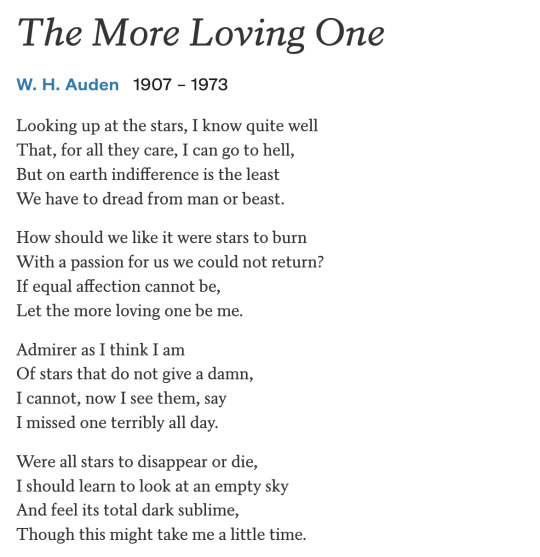
He specially emphasized the line "If equal affection cannot be, Let the more loving one be me".
And lastly, if anyone wanted to know:
His copy of the bible is the Revised Standard Version by Thomas Nelson from either 1952 or 1953.
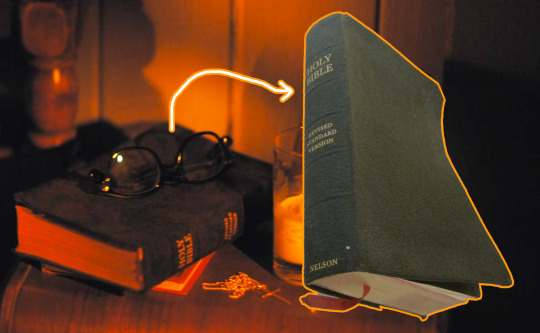
Because why the hell not figure out what specific translation of the holy bible a fictional character was basing his beliefs on — as if the set designers cared nearly as much as I do.
#fellow travelers#fellow travelers meta#tim laughlin#fellowtravelersedit#i know it doesnt precisely fit the tag but hey.. theres a gif right there#this is such a jobless thread... but i AM jobless
126 notes
·
View notes
Text
SEVEN YEARS OF POETRY IN A BOOK
HELLO ALL! I've been working on this project for a while; copying a lot of poems from my blog that had broken formatting from the old days, collecting the ones that I was the proudest of, adding in a number of poems from the archives that never saw the light before; and the result is this, DETRANSFORMATION, an extremely transgender anthology of forty-nine poems, which is 7x7, which I literally only realized now. What can I say, I went for quality over quantity over the years.
Do you like horror movies? Fairy tales? Complicated feelings about Lovecraft? Do you have familial trauma? Depression? Long slow years of regaining life? Do you like it when poems are about a specific ass situation? Do I ever have the loosely grouped into five sections that create an arc that's about 7x as clear in real life poetry ebook for you!
Gumroad was the easiest platform to upload to, and set a 'pay what you want' price of $1 and up; I wanted to prioritize people being able to read it if they want, with room to be more generous if you feel like it and can afford it. If you don't/don't want to use Gumroad, or want me to get the money without Gumroad fees, I've done my best to make the thank-you email for my Ko-fi a link to download the epub; the base price of a 'coffee' is 1$, so you can set your own price from there on up. This is my first attempt at both making and distributing an epub, so if anything is broken or inaccessible you can get in touch with me on here. If all else fails I will literally email it to you. I will convert it as needed. We will make this work.
that's it! I wrote a lot of poems and put them together (and made the cover! look at it it turned out so good!) and I hope you check them out. 🪦💚
#poetry#poets on tumblr#I feel a bit bad for putting poems in a book when they're still broken on here#but tumblr's formatting has been so frustrating for posting stuff#i didn't have the energy to tackle fixing them all yet#and I did make the book cost basically nothing lol#I will try and get back and start fixing formatting on the old broken ones sometime#but for the moment if you wanna support me/get some old and new poems I appreciate it!!
51 notes
·
View notes
Text


This advice leaves me floored. If I read these panels a few years ago, who knows how my college journey could have gone.
A workshop class of mine had an assignment similar to the one in Blue Period where I had to discover a poetry collection of my liking. Then, I had to write a few poems in conversation with the author and a written response mixing analysis of the collection and the thought process behind my poems. Once that part was submitted, the class gave a brief presentation of their project. My confidence throughout the course was low for a few reasons. I've never been well-read in poetry but took an upper-level course out of necessity, thus being surrounded by smart, earnest, and more experienced peers. Furthermore, I knew a classmate secretly found me obnoxious towards the end of the previous semester in another workshop class, making me paranoid about whether I misread the quality of goodwill of my most basic actions and if many others felt a similar, justifiable distaste towards me.
Nothing felt quite right after sampling a list of collections recommended to me by my professor based on my style. I settled on one where some poems clicked, some didn't. Here's where the third reason for my insecurity kicked in: it was poetry within my home region—a place I have a complicated relationship with.
A hatred of where I grew up made the idea of escaping to an out-of-state college attractive, but lack of funds and merit landed me in an in-state university. Instead of being bitter about it, I changed my approach. I acknowledged that I was possibly an edgy young adult who needed a change in perspective from more like-minded people, leading figures, and academics within the region to truly appreciate my home.
That hunch still doesn't have a great answer (especially since I didn't follow my intended approach with as much determination as I should have), but my efforts led to a weird yet relevant consequence: the exposure to differing attitudes and perspectives from my own made me feel like an outsider to the very place I grew up in. Identifying and calibrating any of those people's attitudes and experiences with my own felt like a struggle, and knowing their prestige made me question the authenticity and accuracy of my self-concept. Putting my feelings into terms used by Blue Period, I feared that my perspective was no better than (and the same as) a tourist despite being a local my whole life.


The same self-skepticism crept in when analyzing my chosen poetry anthology. Inevitably, a fork in the road laid before me: do I express antagonism despite my ignorance in the field, the possibility of furthering distaste upon me amongst my peers in my resistance and implied negativity, and a cultural image that seemed so firmly established to where it threatened to undermine my own; or do I commit to an effort in understanding the work so deeply that it surrenders my ego?
The first option… I couldn't bring myself to do it… It felt too arrogant. All those fears compelled a conclusion that there must have been something wrong with me that needed to change. As a result, I tried to put myself in the poet's shoes by mimicking the collection's style. I thought that could have allowed something to click and, if not, I was at least maintaining respect for the poet.

My professor gave feedback on my submission. It's essentially the same idea Blue Period teaches and warns its readers about, with added salt to the wound of the implication that my presentation still hinted ambivalence despite not wanting to. Here's the screenshot:

Did Blue Period allow me to understand the meaning of my professor's advice? A final project for the course required revisions of a few poems of choice out of a variety written throughout the semester. I picked one of the poems from this assignment since a route for improvement looked clear. Despite understanding what my professor meant, the real possibility that those changes were motivated by catering to the one deciding my grade for the course erodes any confidence towards the ideal interpretation of substantiating a newfound maturity in my artistic approach. To clarify, I'm not criticizing my professor—the fact that she identified the repercussions of my problematic approach feels like a miracle. Yet, reading these recent Blue Period chapters let me go a layer deeper.
It's not a straightforward lesson, though. My story doesn't quite align with Yatora's, and identifying the differences allows me to learn from the story with more nuance. Yatora loves Bacon and knows more about him, contrasting with my attitude towards my poet of choice. More pressure was put on me in this regard, for there is a more unsavory aspect in criticizing a poet one has no real attachment towards versus one whom respect has already been made clear. My professor also notes a silver lining that comes with a willingness in trying learn from an author that one doesn't gel with.
Furthermore, Blue Period likes to show how complex and ambivalent navigating through the world of art can be, so I can't dismiss the possibility of the manga throwing a wrench in what seems to be one of the series' most straightforward lessons in a later chapter.
There's great comfort in being able to relate to something I thought was, if not nonexistent to others, left unsaid. Being able to capture this feeling is a testament to the realism in the manga's exploration of art and character work. Blue Period gives a reassurance and almost ironic realization that, even if I struggle to relate to stories near where I live, I can identify with even the most niche feelings and circumstances in stories on the other side of the world.
If I could have done things differently, avoiding antagonism still would've been the right choice, but I'd be looser in how I drew inspiration from my selected poet. Funnily enough, this stumble and the subsequent lesson could have been avoided. I initially disqualified a different recommended poetry collection (i.e., Obit by Victoria Chang) due to it only being accessible digitally. I read it a little before the course ended anyway and loved it. It's tough to call whether how things turned out was the most enriching path compared to a hypothetical scenario where I found and chose Obit instead, but I'd like to think so.
#blue period#yatora yaguchi#tsubasa yamaguchi#blue period manga#ryuji ayukawa#blue period 68#blue period 67
27 notes
·
View notes
Text
[Book Rec + Reaction/Thoughts] The Lantern and the Night Moths 灯与夜蛾 by Yilin Wang
An anthology of translated poems by five modern or contemporary poets and accompanying essays by the translator, @yilinwriter.
You can find the pronunciation guide and list of corrections here!
The cover art, a beautiful expression of the tone of this collection, is by Taiwanese artist Ciaoyin (check out her gorgeous insta!). I'm looking forward to the arrival of the physical book as my tab absolutely does not do it justice xD

Anyway! The official release date is 02 April 2024 though there have been some very thoughtful reviews by early readers already. Here, here, here and here.
(It was an ARC that I received too… though in the time it took to put this together, the ebooks have already gone out to readers >.< typical snail yj!)
Instead, I’ll tell you who I think would be interested in this book or might benefit from reading it, then share things that are cool about it from the perspective of a bilingual hobbyist translator + lover of ancient poetry and lyrics.
Who should read it?
If annotations, translator’s notes and reflections spark joy for you...
If you’ve ever read poetry translations and been intensely curious about what goes on under the hood...
If you’re a translator yourself wanting to hear another voice...
Definitely check this out!
Also if you’re CN+EN bilingual and have ever read something in English that references Chinese terms and concepts etc. except ONLY in English, pinyin or wade-giles and been utterly frustrated by the ensuing guessing game (like me) Fear Not.
That will not be a problem here.
I really appreciate how Chinese words are used naturally where needed for concepts and quotes - they are also translated for those who can't read Chinese so no one is left out. It made this book of and about translation (and more) super comfortable to read! The solution is so simple, so direct, so rarely used that I am amused.
Oh, but do note that the Chinese characters are in simplified though!
The poems are organised by their writers who are listed here by order of birth year, not appearance in the book:
秋瑾 (Qiu Jin, 1875 to 1907)
废名 (Fei Ming. 1901 to 1967)
戴望舒 (Dai Wangshu, 1905 to 1950)
小西 (Xiao Xi, 1974 to _)
张巧慧 (Zhang Qiaohui, 1978 to _)
Altogether, that covers nearly the last 150 years up to now. I’ve never really been into poetry by poets in such relatively recent times, in part because I’d been holding on to this stereotype of them spurning Classical Chinese and ancient poetry in the first half of the 20th century (not entirely true, as I came to realise xD). It made sense and was understandable, but felt sad.
Yet am I the target audience for this book?
Very much so.
In ways I didn’t think I would be too! It was so much fun to experience this both as a reader and a translator that I thought I’d share it here, where we are appreciating Chinese poetry together.
If you didn’t think you’d enjoy modern Chinese poetry, hey, give it a chance!
Oh yeah - on the way home a while back, I was talking to a friend about translation and was surprised to hear that her impression was that it ought to be a straightforward process. Like isn’t it a 1:1 conversion? At some point, ‘what’s the difference between something google translate might return, and how you would say it?’ was asked, and oh that was a delightful question to my ears! I showed her one of my comparison sheets where an original text is laid out alongside multiple translations line-by-line, briefly explaining some common and unique choices and how the people who had translated those probably arrived at the various interpretations. She was pretty amazed to see that the answer to her question was: very different. Hey, it’s a complicated process!
But there’s only so much one can explain in the space of a train ride. That’s why The Lantern and the Night Moths is a book I would also rec to someone like this friend of mine - open minded and curious but never having the chance to think about or encounter the craft of translation.
Like Yilin says, ‘the meaning of a word cannot be fully expressed in one single translation, nor through a series of translation attempts’. She then explains why with great attention to detail and some solid examples from one of the poems with word choices loaded with subtle connotations :D
What's interesting about it?
Okay, for one, Yilin shared a playlist of music that she listened to while working on this book. Here is the link to the spotify one and the one on youtube. Check them out! They sure put me in the mood to read xD (favs: 别知己, 小神仙 & 去有風的地方) Afterwards, this made so much sense like - ah! an audio moodboard.
She's also putting together these adorable mini profiles of each poet along with a cmedia and tea rec to match their vibes. Go see them on her instagram xD
Now to business...
structure
What really helped keep the reader’s focus was the way each section is organized, how the poems and accompanying essay were presented and finally the short bio of each person right at the end.
The poets are first introduced through five or six of their poems, works well suited to this purpose. Their voices, distinct through the vision, ambition and emotion of their words, are brought across by Yilin’s sensitive, thoughtful and poetic translations into English. These translations were also creative and transformative in a way that made so much sense after reading one of her reflections on the process, how she ‘must guide it with gentle hands to ensure its spirit is kept alive and intact during this transformative, and often excruciating process’. A rebirth into another language!
Personally, I’ve come to think of reading translations as looking at a work through another’s eyes. So it’s delightful when the translator’s presence is discernible, and even more so when the reader is given insight into their intention and process via commentary.
Yilin’s essays coupled with the poets’ bios at the end provide a means to go back and appreciate their works in context of their circumstance and inspirations. Similarly, to read the translations with a changed perspective.
I don’t know how much of a thing this is with translated poetry anthologies in English - can count the number I’ve read with both hands lol, and they’re all of the ancient chinese poetry variety - but I really like this design.
drawing on poets who came before them
Remember how we’re always recognizing traces of inspiration from ancient works (to them) in poetry of the various dynasties? 李商隐 Li Shangyin of Tang for example, was influenced by 楚辞 Verses of Chu and folklore and mythology such as that in 山海经 Classic of Mountains and Seas, 李白 Li Bai frequently references poets and history of the 魏晋 Wei-Jin era, and 王维 Wang Wei was clearly familiar with Buddhist scriptures which were translations themselves!
Just like the late Táng poets whom he praised for boldly deviating from the voices before them, Fei Ming used popular references and tropey shorthands ‘in contexts utterly different from the original, reimagining them anew’. Dai Wangshu, too, ‘boldly re-envisioned what modern poetry could look like by revisiting the classics’. In fact, in his very relatable ‘To Answer the Visitor with Classical Imagery’, I see Li Bai’s 春夜宴桃李园序, Qu Yuan’s 离骚 and lots of - as the title says - classical imagery, as if pulling out painting after painting to describe a feeling.
And Dai Wangshu’s faith in the translatability of poetry, that ‘poetry isn’t what is lost in translation, but rather, what survives it’ reminds me of what a friend, @xiakeponz, said that I agree with so much - because readers can ‘experience something in their own individual way through (your) shared humanity rather than language alone’.
poetic tradition and beyond
Between the lines of contemporary poets Zhang Qiaohui and Xiao Xi, I can really see the charm of plain vernacular, how it can be beautiful, incisive and clever in turns. Even as it seems to have moved further than ever from the structure and language of literary Chinese, the themes that inspired common motifs remain a part of life. Mother and divinity, homesickness, finding oneself, tributes to admirable spirits and the issues that trouble society - just in a new form and with different ways of expression.
Qiu Jin
So many FEELINGS about what Qiu Jin was doing - ‘I awaken the spirits of women, hundreds of flowers, abloom’. I would love if she could see the world now. So many things for her to rouse and fight against, but at the same time just as many to be proud of. I am so in awe of her, but now hearing her loneliness and struggle there is a soft spot in my heart for those too.
conclusion
So so so…
Qiu Jin’s admirable fire and lonely resolve. Zhang Qiaohui’s precious ability to express beauty in the mundane and in pain. Fei Ming’s utter delight! He is having so much fun and when* I’m vibing, I feel it too. Xiao Xi’s critical eye and keen observation of the world. Dai Wangshu’s whimsical charm and passion for translation. Finally, Yilin Wang, the connecting thread wound through them all, bringing them together so that we may be acquainted.
*Reading his poetry is like unwrapping a seamless, many layered present. A gift that keeps giving - if only you have a key 😅 Fortunately, Yilin has halved our struggle 🤣
I’ve had such a great time with them all. And if you come, I hope you will too!
#The Lantern and the Night Moths#chinese poetry#Yilin Wang#poetry in translation#灯与夜蛾#Qiu Jin#Zhang Qiaohui#Fei Ming#Xiao Xi#Dai Wangshu#rambly reviews#i read from Fei Ming onwards on my kobo LOL but that one has no colour so...#i might do more of these review-y rambles about poetry things if y'all are interested?#i've been reading LOL#some are chinese some are english#all of them fun and enlightening
40 notes
·
View notes
Text
Taylor & Travis Timeline
April 2024 - Part 2
April 19 - Taylor Swift's 11th Studio album is released; The Tortured Poets Department (x)
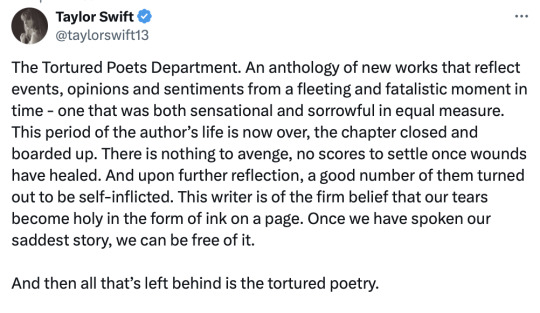
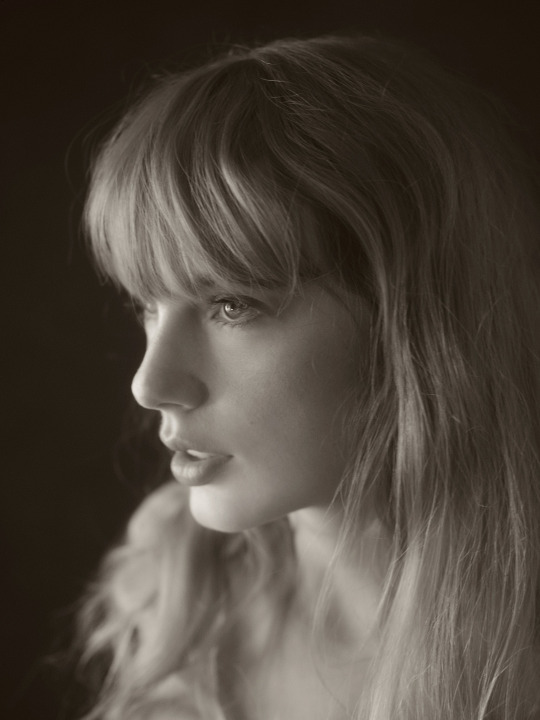
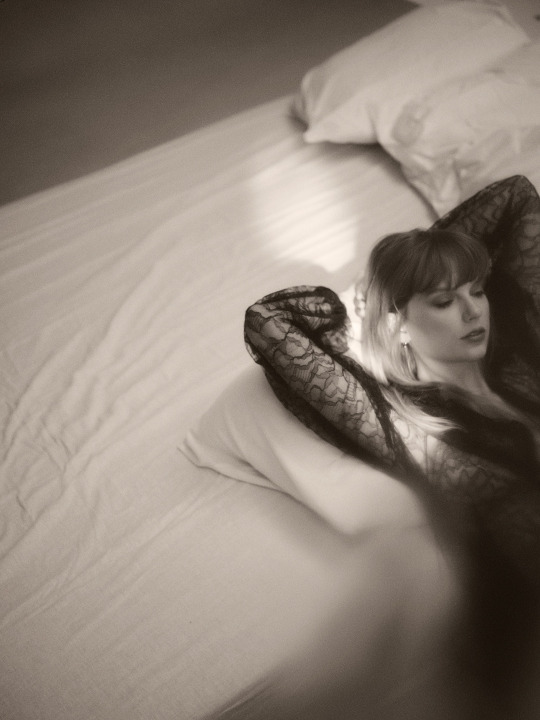

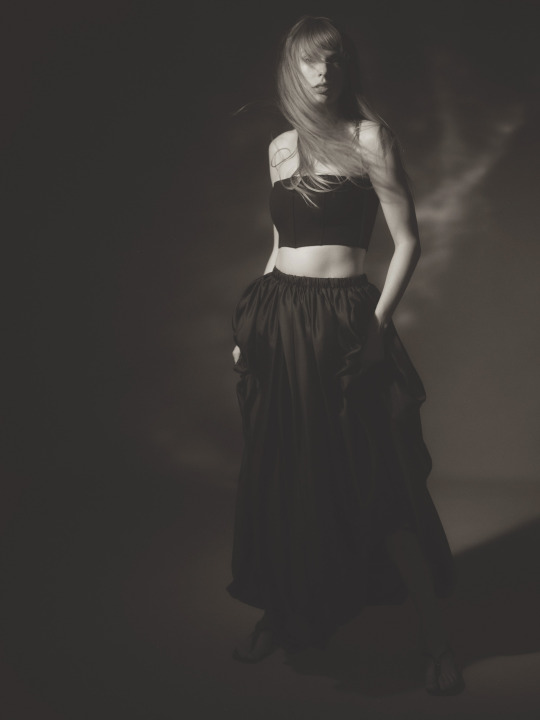
2am - The Tortured Poets Department: The Anthology. 15 more songs released!!! A double album!

8pm - Fortnight (feat. Post Malone) music video premiers on YouTube (x)
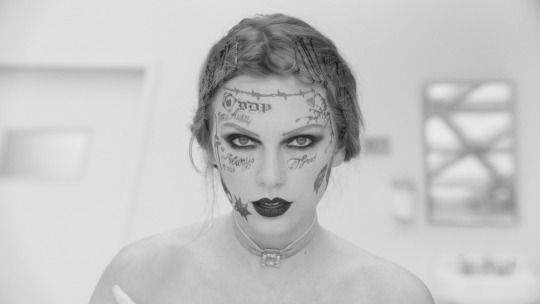
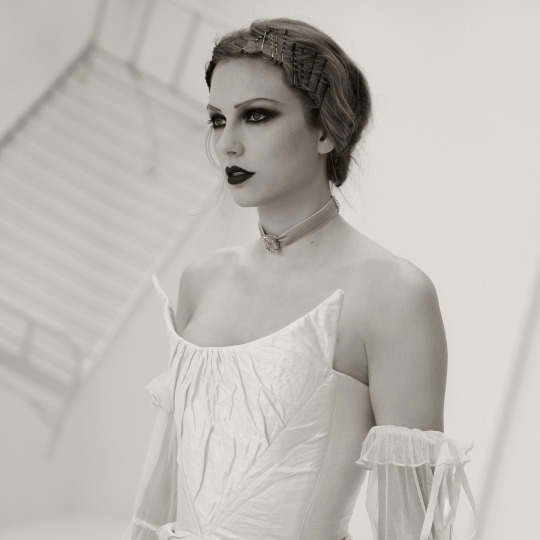
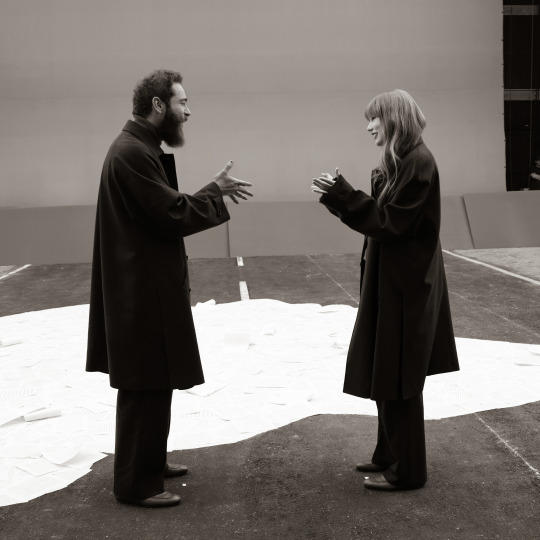
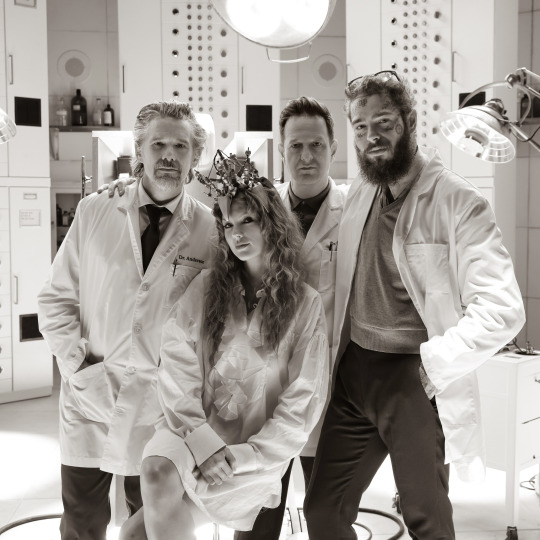
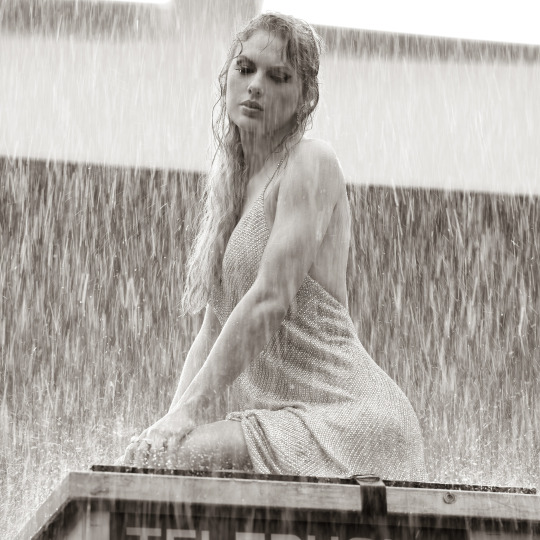
Taylor reads some of the poem in the epilogue on the album... (x)
Taylor shares video on YouTube shorts (x) and IG with some cute footage of Travis, Benji, Singapore & more

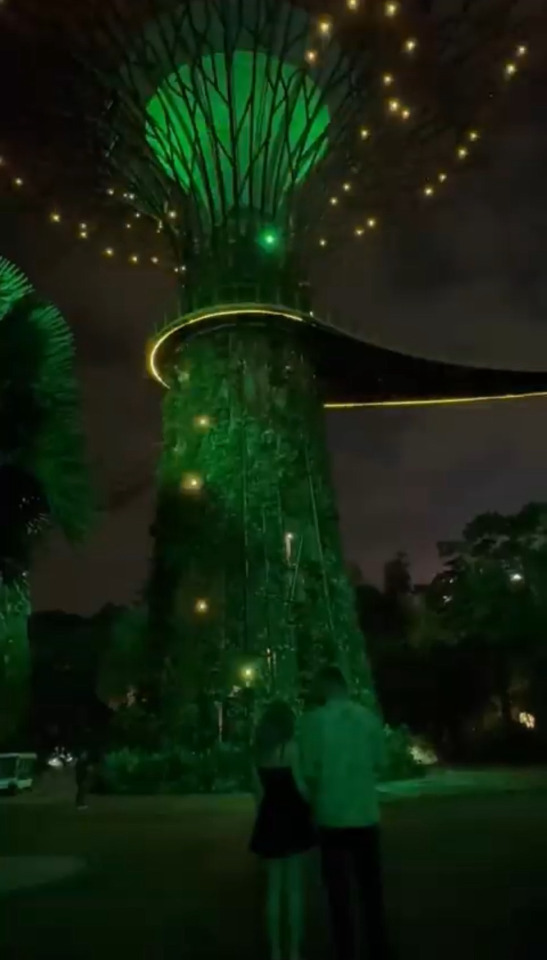
People give a summary of album themes in particular Taylor's fateful situationship with Matty Healy (x)
It becomes evident that Taylor has released the first songs about her relationship with Travis on The Tortured Poets Department (including The Anthology) Are there others?
The Alchemy (x)(x)
So High School
But Daddy I Love Him (final verse)
A source tells Entertainment Tonight (x)
[Travis Kelce] couldn't be more supportive and is pumped for Taylor. He knows how much this means to her and thinks she's extremely talented. Taylor and Travis admire each other's creative processes and work ethic. They cheer each other on, respect each other's opinions, and are open and communicative.
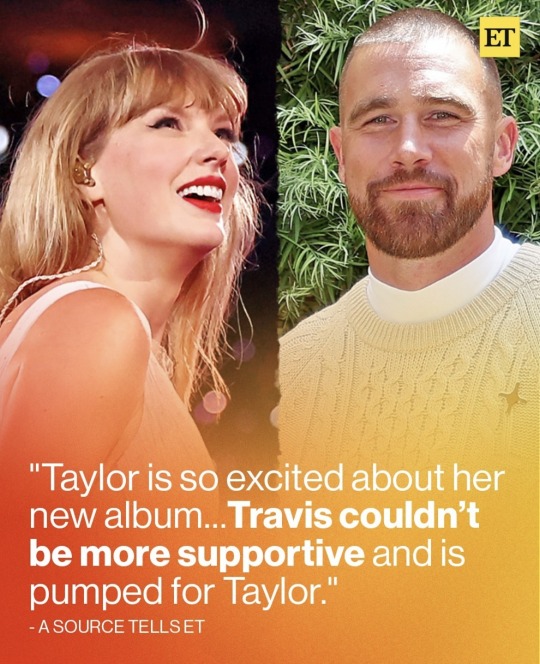
Uproxx reviews TTPD (x)
It’s a chronicle of a specific period of time, one that she needed to explore to be able to move on (having a “squirle”-loving goofball waiting for her at home helped). As she wrote on social media when the album came out, “This writer is of the firm belief that our tears become holy in the form of ink on a page. Once we have spoken our saddest story, we can be free of it.” She’s finally clean.
The Tortured Poets Department isn’t the album people thought it would be. It’s rawer. It’s funnier. It’s more poetic and unapologetically dramatic. Most of all, it’s another classic from the preeminent songwriter of her generation.
April 20 - TTPD lyric videos released on Youtube with a sweet reference to Travis and Taylor in So High School (x) - note the letters TK & TS
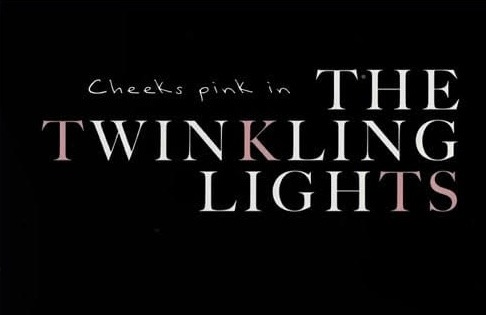
April 23 - Chiefs quoting Taylor's lyrics from The Alchemy on IG (x)
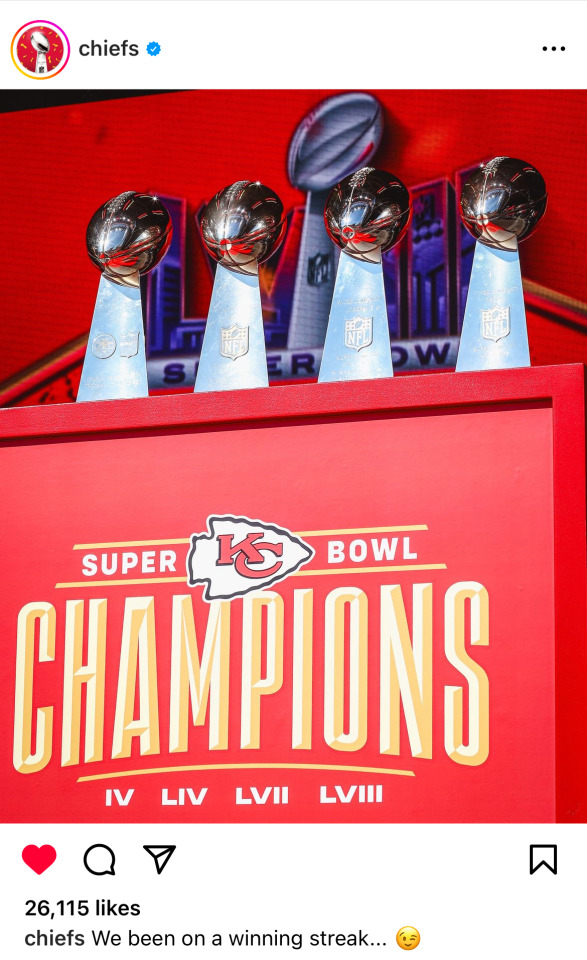
Travis & Taylor snapped out for dinner at Mateo Ristorante, West Hollywood, California

Deuxmoi celebrity gossip receives blind suggesting Travis attended an appointment with jeweller Lorraine Schwartz.

April 24 - Donna Kelce reveals that Taylor & Travis joined Gigi Hadid and Bradley Cooper for a getaway in Carmel-by-the-Sea, California (x) dates not confirmed but presumed to be over the album release weekend.
A source tells ET (x) that Kelce is among Taylor's biggest champions.
"Travis is so supportive of the entire album and loves that he is a part of Taylor's story. He is a Swiftie through and through, and is very proud of her."
Republic Records celebrates Taylor's achievements with TTPD (x)

Go to previous update -> April part 1
Go to next update -> April part 3
Return to the timeline
#taylor swift#travis kelce#traylor#taylor and travis#taylor swift and travis kelce#87 and 89#killatrav#seemingly ranch#Taylor & travis timeline#tayvis#T&T#87 + 13 = 100#timeline#TnT#swelce#travlor#1989#87#13#Tay & Trav#chiefs#kansas city chiefs#chiefs kingdom#the eras tour#love story#TTPD#The Tortured Poets Department#fortnight
23 notes
·
View notes
Text
quick ttpd thoughts
ok so. i did listen to a leak so I had time to sit with the OG album for a while. I have not yet listened to all the Anthology tracks, but this not-doing of something is part of my album reaction. Bear with me.
First of all: I am insanely impressed with Taylor for being this raw and messy on record. More distinguished haters have said that this album once again feels like self-mythologizing, but I personally do not agree. User dancefloors had an excellent take on this: the album is emotional and messy to a degree where you feel like you should not be listening to it. At least that's how I felt.
However, that also has a downside. I find many of the lyrics, especially on the standard edition, to be unpolished or downright cringe. This rambl-y first draft type of writing might work for other artists, but I never feel like it works for Taylor. The second line of Fortnight is so awful that I was CONVINCED the leak I heard was AI, and people have talked at length about the tattooed Golden Retriever. Girl. Almost every song had an insane clunker or two hidden in it. This is not helped by what I personally (!) perceive to be a bit of a rehashing of imagery and themes that have been prominent in songwriting trends for the past few years. Killing the woman you are jealous of, Cassandra, religious imagery .... Don't get me wrong, I think the call for "originality" at al costs can be detrimental to art, but frequently with this album i felt as if lines were haparzadly chosen to fit a certain "aesthetic" that didn't mesh well with the rest of the song. Like. Nothing about "my husband's cheating. I wanna kill him." communicates any deeper emotion. (Compared to e.g. Samia's "I hope you marry the girl from your hometown and I'll fucking kill her and I'll fucking freak out.")
The introductory poem is one of the worst things i have ever read.
The thing is. I don't always do well with new releases, they are overwhelming, etc., but I listened to the first four tracks and was like "how can anybody think this is good". Which IS a hater take, and there is much I do enjoy about the album, and I am happy others like it.But with the already present repetition PLUS 15 Tracks .... it is a bit too much. I could go on and on about the repetition of words and themes that feels a bit trite (smalltown stuff, "starry-eyed", "precocious"), but I don't wanna. I wish there had been more editing, and I think I have talked at length before about how I do not like this new era of just putting out everything.
Alas. I did not click with this album and there are very few tracks i want to go back to. So Long, London is a favorite because of the concise lyrics and beautiful production, I can bop to Down Bad, but daddy I love him is fun imagery-wise, Clara/Sam/Sophia/Marcus is sad and also. A Lot., So High School, and I dig "You're not Dylan Thomas, I'm not Patti Smith, this ain't the Chelsea Hotel, we're modern idiots". The 2am tracks need more attention, but I already like Looking Into Windows (?) much more than a lot of other tracks - generally, I enjoy the more genuinely sad Joe tracks about the slow demise of a relationship much more than the fast paced high strung ones.
anything else .... well. I don't know.
32 notes
·
View notes
Text
toa anniversary munday!
Celebrating TOA and the people who contribute to make our group what it is.
Repost, don't reblog. Only fill in what you feel comfortable sharing!
Happy anniversary, TOA! Here's to many more years spent together.
Name: Nic
Pronouns: they/them
Birthday (no year): 14th July
Where are you from? What is your time zone? UK, GMT (or BST but don't get me started on daylight savings I'll explode)
How long is your roleplay experience? Does playing A Bug's Life on the playground when I was 5 count? If not, I started with rping HP characters with my friends when I was like 11-12 over MSN after school and whilst there have been breaks it's something I've always found myself coming back to.
How were you introduced to roleplaying as a whole? As above, I made a couple of friends on (unrelated) forums and we all just thought it'd be fun.
How were you introduced to TOA? I thought I missed rp and looked for an FE based rp.
Do you have any pets? Yes, all hail Catcat the Great.
What is your favorite time of year and why? (Season, holiday, general period) Summer. I hate the heat and humiditiy but once there's no daylight the seasonal affective disorder bass boosts my chronic mental health issues and it's just a bad time really.
What is your IRL occupation? I've gone back to uni to study Law :)
Some interests and things you like/enjoy? I love reading, I'm fascinated by linguistics and astrophysics, enjoy DnD and playing video games in my spare time. I'm a particular sucker for the Sims franchise.
What non-Fire Emblem games do you play? Recently I've been playing BG3, Stardew Valley, The Sims & Fields of Mistria but I'm a big fan of the Persona series and really, really excited about Dragon Age The Veilguard
Favorite Pokemon type & Pokemon: I don't really play Pokemon much anymore but I'll just say Sylveon I guess
Tell us some funfacts and trivia about yourself! I met the fourth Doctor when I was 11 and he complemented my vocabulary lmao. I once got published in a poetry anthology with a poem about Shadow the Hedgehog and my parents we so proud of me.
How did you get into Fire Emblem? I think I saw a review on TV
What Fire Emblem games have you played? I've attempted to play every game except 1/2/3/5/11, although I've really wanted to play Thracia I just *need* some QoL updates and controls. I haven't finished every single one because of lost/deleted saves and stuff but I've watched playthroughs and read up on scripts on everything I haven't actually played myself.
First & Favorite Fire Emblem games: My first was Fates but Jugdral, Magvel and 3 Houses are my favourite
List your 5 favorite Fire Emblem characters across the series! Elincia, Mercedes, Franz, Myrrh and ughhhh I can't choose between Chole/Yunaka/Sylvain so I'm cheating
Who was the first character ever to make you go “ooh I like this one in particular” and why? Can be any context and reason! I saw Ryoma in all that red armour and it grabbed my attention.
Any Fire Emblem crushes? 😳 Miss Mercedes if you're free Thursday night
If you’ve played (or are familiar with) the following games, who was your first S support? Who would you S support nowadays?
- Awakening: Chrom, originally be accident but now on purpose :D
- Fates: My first was Takumi and I didn't know what an S support was and was very confused. Nowadays usually Kaze or Laslow if playing F!Corrin and Orochi, Nyx or Charlotte if playing M!Corrin. Niles for either.
- Three Houses: Mercedes. She's still my go to ofc but I'm also fond of Dorothea, Dimitri and Sylvain. If I'm playing M!Byleth Yuri or Ingrid
- Engage: Yunaka was my first and now it's either Yunaka, Diamant or Chloe. Or Mauvier maybe hahfsdgfsd
Favorite Fire Emblem class? I love Pegasus Knights!!!!!!!
If you were a Fire Emblem character, what would be your class and stats? Would you be playable? Probably a reluctant recruit who accidentally gets involved. Weirdly magic based armoured character.
If you were a Three Houses character, what would be your affiliation? (Black Eagles, Blue Lions, Golden Deer, Church of Seiros, Those Who Slither in the Dark, unaffiliated civilian, other - for example Almyran)
Either unaffiliated civilian or Blue Lions probably
If you were an Officers Academy student, what would be your boons, banes and potential budding talent?
Boons: Lance, Reason, Heavy Armour
Banes: Bow, Faith
Budding Talent: idk Axes or Flying?
If you were an Engage character, which nation would you originate from? (Firene, the Kingdom of Abundance; Brodia, the Kingdom of Might; Elusia, the Kingdom of Knowledge; Solm, the Queendom of Freedom; Lythos, the holy land of the Divine Dragon; Gradlon, the desolate land of the Fell Dragon)
No idea! Probably Elusia or Firene. The Solm heat would literally kill me.
How do you pronounce TOA? 🤔(separate letters, to-ah, other?) TOA ;) (like Noah)
Current TOA muses: Elincia & Mercedes
Past TOA muses? A lot but most memorable to me are Sylvain and Julia, though I'm so excited to see Sylvain in good hands <3
Who was your first TOA muse? If you no longer have them, can you see yourself picking them up again?
Elincia and I still have her.
Do you believe you have a type of character you gravitate towards writing? White magic girlies though I'm trying to change things up.
Do you have characters or types of characters you don’t think you can handle writing, but wish you could?
Hm, I wish I felt I could write more of the male characters I enjoy effectively. In most other fandoms I've written in most of my muses have been men but it's just not so in FE. I'd also love to write a villain okay I once genuinely considered Hilda FE4 lmao
What kind of scenes, situations etc do you believe you enjoy writing the most? (If you filled this out last year, has this changed in any way?) I like writing dialogue and characters bonding but I'm starting to like more action oriented scenes too.
Do you have any scenario in mind for your muse(s) that gets you thinking “man I hope I get to write this one day”? For Mercedes in particular I get excited to write her steel and strength, especially when it's combined with her gentleness rather than opposed to it.
Favorite TOA-related memories? Every thread I've writen with Elincia and Rua's Byleth <3
Present or past tense? I tend to default to present in TOA but usually past tense. I'm flexible though and will try and match my partner.
Normal size text, small text, no preference? I actually find small text easier to focus in on and read (I can find normal a bit too cluttered and it can send my eyes wandering lmao) but I'm perfectly happy to use normal text, it just takes me a bit longer to comb through.
Got any potential muse delusions to share? 😉 I can't see a shake up happening soon but... Zephia or Chloe are probably forerunners. I've thought about Palla and Astrid too but I'm not sure if I can see the longevity. Also Neimi, Myrrh and Rodrigue have sparked.... ideas. For muses I've written before, Julia is the most likely but I think she's having a nice break right now :)
8 notes
·
View notes
Text
Mother Love - Demeter and Persephone in poetry
Alright, so, let's finally talk about Mother Love.
I've spent the past couple of weeks compiling most of the poems from my physical copy of Mother Love into a publicly accessible google doc because there is a quite frankly embarrassing lack of archiving of this particular anthology of Dove's work and I am genuinely and greatly saddened that it is not a work more commonly brought up when discussing Demeter/Hades/Persephone retellings and reinterpretations for modern audiences.
In order to speak about what Mother Love is, I first need to address what it is not. It's not a coming of age story which portrays Persephone as a caged bird under a too-smothering Demeter. It's not a love story where Hades is some valiant hero who rescues an innocent maiden and through his love empowers her to be her truest self. It does not demonise Demeter, who has forever lost her daughter, it does not demonise Hades, who took that daughter away.
Instead, Mother Love is, perhaps, the truest interpretation of the themes of the Homeric Hymn to Demeter that I've seen, down to the structure of the anthology mimicking the hymn's narrative structure. It is the story of a mother who loses her daughter, of the grief that ensues as she worries for her, of her being pitied and given empty words instead of help finding her, of her trying to soothe herself by filling the void with new children that are not her own. It is the story of a daughter who loses her way, who went seeking flowers and was unwittingly caught in the machinations of those in higher positions of power than her, of the kingdom she is promised and refuses, of the changes she goes through in this new, strange world without her consent and how those changes will define her the rest of her life. It is the story of a lonely king overrun with ennui who wants companionship but never asks, of he who tries in vain to tempt with wealth and land and must ultimately yield to the love of a mother. Not even the lord of the dread Underworld can escape that all-consuming mother's love and this was a theme found all over greek mythology and their literature, and it is also the theme that has been unfortunately and miserably lost as we've told and retold the tale of Hades and Persephone time and time again.
Please, please read this work, and if you enjoy it, do consider picking up an actual copy of the anthology. There is so much to be gained from speaking of the Demeter/Hades/Persephone myth as one of nuance and devoid of the unnecessary moralisations and accusations that we habitually foist onto cultural figures and heroes in an attempt to validate our opinions and interpretations to our peers. In my compilation, I did leave out three poems: Breakfast of Champions, Blue Days, Nature's Itinerary, mainly because I did not think they were relevant -- but I'm always open to requests for those poems to be added to the doc if anybody gets curious. Below I've also attached a few of my favourite short poems from this anthology so people can get an idea for the content that is included in the doc.



@gotstabbedbyapen who requested a way to read these poems but could not find them, I sincerely hope you enjoy them <3
#ginger chats about greek myths#I AM BEGGING Y'ALL READ THE BOOK#ON MY HANDS AND KNEES#Absolutely fantastic anthology of poems and genuinely I think poetic interps of myths is a medium that is aggressively underappreciated#This anthology in and of itself is in honour of a previous older anthology of poems#Rainer Maria Rilke's Sonnets to Orpheus#Which is a monster of an anthology and a topic I will gush about another day#I think I'll talk about some of the poems individually? Maybe like a Mother Love Monday type thing because god I've not been able to shut u#about these poems for literal years#We'll see how it goes#hades and persephone#hades#persephone#demeter#poetry#rita dove#ginger rambles#greek mythology#greek myths#the urge to tag this lo and boz is so fucking strong#but I will be disciplined#READ THESE POEMS I BEG OF YOU GOD
11 notes
·
View notes
Note
I’ve loved following along with your NaPoWriMo poems! Any advice or tips for someone who’s thinking about trying out writing her own poetry?
I am so glad you've asked this question, because one of my main emotions during National Poetry Writing Month was anger at all the people who made poetry seem like this agonizing endeavor that only the most intelligent and soulful should undertake. As I got going, I found that it was fun. It was easy (or at least a fun challenge). It stretched my brain in new ways, and let me express things in a new creative format. I think everyone should get the chance to experience that, and I want to encourage everyone to try.
So here's my:
Guide to Writing Poetry For Absolute Beginners
Read a poetry anthology: One that collects works from multiple different poets across lots of different time periods. Ideally, one meant to introduce children to poetry, because children are going to want poems that are enjoyable, understandable and fairly straightforward--which is much easier for a beginner to imitate. Reading A Child's Anthology of Poetry was what first made me think poetry was something I not only wanted to do, but I could do. Reading a lot of different poets made me learn which styles I liked and didn't like, and gave me examples to keep in mind when I decided to write my own poetry--for example, I kept Sara Teasdale's poetry and this A.E. Housman poem in mind a lot during the month, because I found I liked short, rhyming poems that talked about nature with fairly straightforward language.
Don't be afraid: Poetry should not be intimidating. Ignore the books that say it's an agonizing endeavor. Poetry is putting words on a page, and then rearranging them to say what you want to say in a cooler way. That's it. Don't make it more complicated than it has to be. You don't need to scrape out the innermost depths of your soul--you can just tell people about something you saw, maybe share a thought about it. It can be simple. It can be fun. It's fine.
Do not try to write good poetry: This is the most important rule. Staple it to your forehead. Write it on the wall. As an absolute beginner, a lot of what you write is going to be bad poetry--and that's great! It means you're creating poetry! Which is much better than not creating poetry! Worrying about whether your poetry is "good" or "bad" is the easiest way to destroy your enjoyment and keep you from writing poetry. I cannot tell you how many times during April I looked at my poetry and thought in dismay, "Wow, this is really bad compared to other poetry," and then remembered, "Good thing I'm not trying to write good poetry!" and happily continued writing. If you just keep writing, whether it's good or bad, you're going to wind up with a lot more poetry--and have a lot more fun doing it--than you would if you'd let yourself worry about quality, and writing more poetry is a great way to get better at writing poetry.
Use prompts: I found that the prompts for National Poetry Writing Month were a great source of inspiration, giving me guidance when the idea of poetry was so new and intimidating that I didn't know where to begin. Not every prompt is going to inspire you, but the ones that do can be a great way to stretch your imagination. Having a community was also great--seeing other people respond to the same prompts made the idea of filling those prompts less intimidating--but I recognize that's not easy to arrange outside of National Poetry Writing Month.
Short is good: Short poems take less time to write. They make you focus on one or two things you really want to say or images you really want to use. They're easy to structure--set-up an image or an idea, resolve with a thought about it, and then you're done. You can write longer poems if you have an idea that requires it, but keeping your poems short is a great way to get a sense of accomplishment very quickly.
Play with rhyme and meter: Because it's fun and I like it. Because it makes you think about the sound of the words you use and encourages you to think about word choice and word arrangement. Because it can make a poem feel more structured and complete. Because the rhyme or meter you choose can help you figure out how to structure your idea. You don't have to use it for every poem, but I find that using it can make it easier to turn an idea into a poem, because it forces you to pare down your ideas to fit the structure.
Use poetic forms: For many of the same reasons I encourage you to try rhyme and meter. A poetic form can help give your ideas structure. It turns poetry into a fun crossword-style game. There are a lot of short, familiar poetry forms to start out with--I began with a limerick and a haiku--but there are tons of possibilities. When I needed inspiration for a poem, I often looked through this list--when I found a form that looked intriguing and doable, I'd try it out. Often, a certain form will suggest certain topics that would work well in that format, so this method can help with brainstorming, too.
Don't be afraid to branch out: It's fun to use rhyme and meter, keep things short, and use established poetry forms, but if you come up with ideas that don't do any of that, go for it! Especially after you've written a few poems--you've learned what you like and don't like, what works and doesn't work for you, so you can use your knowledge to branch out and try something new.
Observe your surroundings: It's a great way to get images and thoughts to inspire new poems, especially once you have a few under your belt and learn what kind of ideas lend themselves well to poetry.
Have a deadline: I found that having a poem-a-day goal helped me to write much more than I would have otherwise. I couldn't tinker with a poem forever--I had to post it by the end of the day and then move on. One day, I'll have to learn how to revise poetry, but that's a goal for when I'm not an Absolute Beginner. For now, finishing poems is the more useful goal.
Remember, all of this is advice from an Absolute Beginner who has been writing poetry for barely over a month. There's a lot I don't know, and I'm just sharing what worked for me. But as an Absolute Beginner, I feel I'm qualified to tell other Absolute Beginners that the endeavor of beginning to write poetry is absolutely worth it.
#answered asks#poetry#napowrimo 2024#fictionadventurer poetry#also: i'm so glad you enjoyed following along with my poetry#it was so fun to share it with all of you#and the accountability is probably the reason this is one of the only month-long writing challenges i've ever won
11 notes
·
View notes
Text
John Lee Clark:
"Since then, though, protest has remained the primary mode. Perhaps it’s because Deaf people’s cultures and languages continue to be marginalized. Protest is a worthy, logical response, but it can also be limiting. Instead of the full range of our realities and imaginations, we get drawn into arguments we did not choose for ourselves. For example, “visual music” and “ASL is beautiful” are the two most common tropes in Deaf poetry, working to counter audist notions of deafness and muteness; meanwhile, in real life, Deaf people are busy cooking, videochatting, texting, dating, raising families, and making transactions, not all of them legal. I realized that I needed to write beyond these arguments, not to leave behind our causes or obscure my identity, but to claim more and more space in which we can just be."
Jim Ferris:
"We. I presume, I claim an “us,” even though there are myriad ways of embodying (and denying) disability, and no two disabled people’s experiences are the same. Disabled people are well schooled, whether impairment is acquired early or late, to identify with and aspire to be as much like nondisabled people as possible.
But if we don’t claim our difference, if we don’t write disability, the normies will keep doing it for us. It is crucial that we don’t keep leaving the field to them, even when we love them. Even when they tell us it’s for our own good."
Jillian Weise: "I like John’s point: “We get drawn into arguments we did not choose for ourselves.” Sometimes I feel like I would rather talk about Kathy Acker. But what does the word “disability” mean? Is it useful to me? Can I get some heat from it? I am reminded of what Borges said to his nephew, “If you behave, I’ll give you permission to think of a bear.” Most often, I think about disability when I am asked to think about it. Then I feel an obligation to behave.
[...]
Yes, there is ableism. One able-bodied writer said to me, “Jillian, do you know why we use disabled speakers?” Do tell, Grandmaster. “Because all writers are outsiders and disabled speakers are the most outsider.” Noted. But I also hear this kind of thing: another writer once wrote to me, “I wish your book was not so dominated by disability poems.” And there’s the trap of ableism: disability is for able-bodied writers to write, because it’s easy for them, and they don’t have to think too hard about it, but disabled writers should stay out of it altogether."
John Lee Clark: "I agree with Jillian. Editors really need to start rejecting that kind of bad poetry. But I’m more concerned about what they do reject as “too niche,” “not a fit,” or simply “not poetic material.” Isn’t that funny? They are happy to publish poems with made-up disabled speakers, but these are mainly by poets who aren’t disabled, or, which is sometimes worse, by poets who are disabled but follow the “script.” You get a very good idea of what’s expected of you when editors ask you, “Why don’t you include something about how hard it is to be deaf?” or, “Why don’t you write about the things you miss seeing?” I get tired of explaining that it isn’t hard to be deaf or that I don’t regret becoming blind."
John Lee Clark:
"There’s something amiss — and missing — in publishing. Thirty million Americans are Deaf or hard of hearing. Add to that twenty-two million for the blind slice of the pie, and millions more for other groups — physical disabilities, different kinds of intelligences, and the rest — and what do we have? Nearly a quarter of the total population? Thanks to the capitalist interests driving the medical industries, that number is always growing, as more and more things are targeted as “abnormal” and in need of treatment. Disability is a major, major realm. But you wouldn’t know it from reading literary magazines or any of the “name” anthologies."
Jim Ferris: "How to change that bias? My best answer is to write the poems that you want and need to read, and keep sending stuff out there. (I’m speaking to myself as much as anyone else here.) Because there are editors and publishers and most importantly readers who are open to our work, who want our work, whether they know it before they see it or not. One of my poems is in part about rejecting messages that disabled people get about changing or at least hiding their nonconforming bodies. I have been repeatedly surprised at how powerfully that poem speaks to others who have heard such messages, particularly breast cancer survivors. I had no idea. What a robust reminder that my job is to make these little paper airplanes as well and as beautifully as I can and then sail them out into the breeze. How far they fly, where they land, what happens after they land — this is none of my business, except as it helps me to make the next airplanes better. My work is to make them and sail them — and then make more."
Jillian Weise: "May I talk about a different swindle? I was told there are speakers of poems and I believed it. When I invented disabled speakers I was told, “Those aren’t speakers. That’s you.” With minority writing, then, you don’t get the privilege of yourself. Self is constructed elsewhere. You are expected to be the speaker and represent the minority. Though, as Jim mentions, we’re not recognized as a minority yet. You are expected to be moral and teach. I think this is why Amiri Baraka wrote “Fuck poems / and they are useful.” Or what Laura Hershey meant by “Everything you say will prove something about / their god, or their economic system.”
I think there are certain kinds of disabled poems that some publishers want: the speaker overcomes disability; the speaker’s friend/relative is disabled or diagnosed; the speaker notices a disabled person on the side of the road. I avoid those poems at all costs."
Jennifer Bartlett: "Editors also may fear the considerations of “disability poetry”; real truths about prejudices and studies on the difficulties of the corporeal. No one wants to read that! It’s too scary. What people want to read in terms of disability is the aspect of how awful and difficult it can be. This leads readers to develop empathy (or her naughty sister pity), which is something they can connect with.
I have a current manuscript that questions and pushes the issue of ableism in a direct way. I’ve had a really hard time getting it published. I often am slow to publish, but sometimes I wonder whether the manuscript has been in limbo for so long due to its content. I try to imagine an able-bodied publisher who will publish a book directly challenging ableism. I do not have an answer."
from the article "disability and poetry", an interview with Jennifer Bartlett, John Lee Clark, Jim Ferris, and The Cyborg Jillian Weise, here: x
6 notes
·
View notes
Text

𝐈𝐍𝐓𝐑𝐎𝐃𝐔𝐂𝐈𝐍𝐆 ... 𝐄𝐍𝐙𝐎 𝐌𝐎𝐑𝐄𝐓𝐓𝐈 .
Oh, is that LORENZO ‘ENZO’ MORETTI? I heard the TWENTY SIX year old is MAGNANIMOUS. But don’t let that pretty face fool you, they are also WAYWARD. Makes sense seeing how they are an INFORMANT in the SERPENTS gang.
full name: lorenzo ' enzo ' moretti .
age: twenty six .
date of birth: february 1st.
gender: cis male .
sexuality: bisexual / biromantic .
status: single .
positive: loyal, charismatic, kind, extroverted, comforting, attentive, empathetic, romantic .
negative: regretful, self-sabotaging, paranoid, pessimist .
aesthetics: eyes that seem to read your every thought, ringed fingers clinking against a beer bottle, travelling the whole world but never finding home, heart pounding under the influence of tonight's drug of choice, impulsive propositions that flash like neon signs, the crave of love vs. the crave of chaos.
the morettis thought they were done having kids, with dante and ella rounding out the perfect family. enzo was a mistake, an after thought, and although that felt shit at times - it did grant him a freedom from expectation and legacy.
growing up, he was pretty naive to any disruption that his family caused people. it was just always normal for him, his version of reality completely warped by the luxury he was brought up in.
lorenzo never embodied the same power his father did, or dante. he's more of an understated leader - smart and extroverted, but also a listener and willing to follow and relent if that's what's needed to succeed.
with access to the best education, enzo sailed through school with ease and got a place in columbia university majoring in english language and literature. it was an obvious choice, with enzo's obsession with reading and escape through books. he'd always had an underground dream of being a writer.
although seemingly having his shit together, he's still very much a product of his environment. the untouchable element of his last name leading him to nights spent partying, wasted and high, enjoying the feeling of people around him.
after graduation, enzo travelled for a few years. sometimes solo, sometimes with friends. dart thrown at a map to decide his next destination. he never really felt like he belonged anywhere, not in new york and not anywhere else that he visited. as a romantic, it felt natural that his home would one day end up being a person, instead.
he's been back full time for the past two years, all roads bringing him back to the city. as an informant in the serpents, settling into a routine that his father approved of and rooting himself to one place for the first time in years. his father's death has rocked him, the seemingly untouchable feeling of being a moretti suddenly feeling vulnerable. enzo has been mostly trying to support his mother, and process his grief in a city where his father was a massively controversial figure.
𝐇𝐄𝐀𝐃𝐂𝐀𝐍𝐎𝐍𝐒
lorenzo has dozens of journals that he filled in on his travels, detailing the people he met and the places he's been. he's never let anyone look at these.
he's an amazing cook, and will always be willing to make something for the people he loves.
by nature, he's more of a relationship guy than a hook up guy. he's known to get attached, which he likes to avoid because of the vulnerability.
has published poems in anthologies under a pseudonym.
growing up, he always threw a birthday party on the night of 31st jan as a joint ' we made it through the first month of the year ' party.
2 notes
·
View notes
Text

Movies I watched this week (#186):
“How can Zuckemborg let this happen?…”
Thelma (2024) is a lightly-paced, adorable comedy about a strong-willed 93-year-old June Squibb, who's scammed of some money, and is determined to get it back. I loved it because she reminds me of my own independent mother (94), and because we need more non-condensending movies about really old people. Also starring very old Shaft (Richard Roundtree) in his final role, very old Alex deLarge with an oxygen tank, and as 'Winston', the very same guy from 'Focus Group'. 9/10.
🍿
Last week I discovered British auteur Terence Davies, and saw 5 of his movies. Distant Voices, Still Lives (1988) is the first feature he directed, another period piece based on his own tortured youth in poor working class Liverpool of the 1950's. With abusive father Peter Postlethwaite, his traumatic memories remain bearable only when he reflects on the other members of his family. They only survive because they can sing. Unvarnished pub-life, where the rituals of drinking, and carrying on together transcend. No wonder the British film critics hold this film is such high esteem.
🍿
2 by Yugoslav Zvonimir Berković:
🍿 My apartment (1963), a young girl narrates her impressions of moving into a new apartment. A lovely snapshot of post-war realism.
🍿 Rondo was decidedly not what you would expect from socialist entertainment of that time. A psychological play of ménage à trois between a sculpturer, his wife, and a judge who starts as a chess partner to the man, becomes a friend of the two, and then seduces the woman. It was interesting, but eventually became unfocused. The actress, Milena Dravić, was one of these pretty European divas from the 1960's. 5/10.
🍿
My 17th & 18th by Agnès Varda, both about Parisian streets:
🍿 Varda made Daguerréotypes in 1976, when she had to stay at home with her baby. So she shot around the street where she lived, 90 meters on each side. It's basically the life of the little stores, and the customers who visit them. The local boulangerie, plumber, hardware store, butcher, accordion repairman, the small grocery, perfume maker and barber. Also, a driving instructor and a magician who dropped by for a show. Absolutely beautiful.
🍿 L'opéra-mouffe (Or as it was called in English Diary of a pregnant woman), one of her own favourite films, is a wordless, impressionistic poem about the Rue Mouffetard street market. What a great photographer eye she had! Lovely visuals with lovely-as-always score by Georges Delerue. Perfect! 9/10. [*Female Director*]
🍿
Three ages (1923), the first feature Buster Keaton wrote, directed, produced, and starred in. A 3 part anthology about love, repeating the same story during the "stone age", Roman times, and at present. The Stone age predate The Flintstones aesthetics. Includes some great, classic gags.
🍿
2 Nordic Noir (both from 1949):
🍿 Another classic Danish Noir from their most prolific period of the 40's and 50's, John and Irene is about a pair of small time ballroom dancers who travel all across Scandinavia, struggling to make a living. The woman, Bodil Kjer, is tired of their hardship, the man is naive and tries his best. Her unhappiness, and yes, nagging, driving over the edge. It's dark and tragic, dealing with powerlessness in a slightly different way.
🍿The debut film by Edith Carlmar, Death Is a Caress was the first Norwegian film directed by a woman. It used the same framing devise of flashback confession, and told again of an obsessive, ill-suited love affair. This time between a young auto mechanic and an older wealthy femme fatale. But it was weak and completely unconvincing. [*Female Director*]
🍿
Watching John Wick (after reading this fluff piece on GQ about the saintly Keanu Reeves). They killed his dog, so he seeks revenge on the evil Russians, check. I am not the target audience for this type of action flicks. But it's filled with nothing but male cinematic cliches: The Mustangs always revs, Whiskey for breakfast, it always rain during funerals, and the video game-action, wow, the action... 2/10.
🍿
2 shorts about pussies:
🍿 Pussy (2016) is a line-drawn animated short about a woman who relaxes alone at home, decides to smoke some pot and play with herself in the bath. Delightfully funny first film for a young Polish maker. Sweetest NSFW film of the week! [*Female Director*].
🍿 Pussy's Breakfast, a fantastic 1905 film about a girl and her cat eating breakfast, enhanced and colorized version. 9/10.
🍿
3 horrifying documentaries:
🍿 "Why have you avoided confronting your family past?"
I've been obsessively thinking about the Nazi "Final Solution" for 50+ years, so I've come to despised most movies about the holocaust. 'The Zone of interest' was different, because it tackled the subject soberly, with unsentimental brutally. Now comes the new documentary The Commandant's Shadow, which is like a companion piece to 'Zone', tackling the same topic, Rudolf Höss’ family life. But it approaches it from a different angle: The generational trauma suffered (only partially by his son who's 87 now) but mostly by his grandson. And it contrasts that with a parallel story about a Jewish survivor, now 98, and her adult daughter. Together, these four deal with the burden of knowledge, shared guilt over unspeakable horror that was not of their doing, but which cannot be diluted even after 80 years. It features (new-to-me) footage from inside the camp, including many of the selection. Harrowing and hard. 9/10. [*Female Director*]. [Screenshot Above].
🍿 Retribution, "Investigating Trump, Project 2025 and the future of the United States". A scary Australian doc. which was released just after the assassination attack on Trump, so it's very current. They interview both critics as well as some of the proud architects of Project 2025. Absorbing, alarming and well-done. 8/10.
🍿 People You May Know (2020) is about Cambridge Analytical, and the misinformation warfare conducted by the ultra-right with the help of Big Data. How the The Council for National Policy and others brainwash and radicalize evangelical Christians, in order to merge State and Church. It's highly disturbing and mostly-known information, but it was done in a sloppy, amateurish way.
I must stop watching documentaries about religion - It does nothing but aggravate me!
(These last two were found on a list by Mara Einstein, a professor of media studies with a specialty in religion and cults. She recommends the documentary 'Bad Faith' as the best documentary on the subject. Having seen it recently, I agree.)
🍿
3 more by Russian Aleksandr Petrov:
🍿 Petrov is a Russian animator who employs pastel oil paints on individual glass plates, a tedious process which causes his films to look dreamlike and surrealistic. He usually tells stories with old-fashioned agrarian themes, like classic Russian literature. I previously saw his Oscar winner 'The old man and the sea'.
The Dream of a Ridiculous Man is based on a Dostoevsky story, and is narrated by Alexander Kaidanovsky ("Stalker"). A suicidal man finds a reason to carry on after meeting a little girl. Fantastic hallucinations. 8/10.
🍿 My love, a romantic story about a boy and two young girls, done in the same dreamy style. It was released by Ghibli Studio, as they expanded their world-cinema offerings.
🍿 The cow (1989) is a symbolic little story about a village boy and his cow. Nominated for an Oscar.
🍿
A bunch more short films:
🍿 Larisa is a tribute to filmmaker Larisa Shepitko, made in 1980, a year after she died in a car accident at the age of 40. It's my first film by her husband, Elem Klimov. (I know! I couldn't make myself watch his 'Come and see', but now I'll see that, as well as her 'The Ascent')
🍿 Students at an Hungarian film school were shown a black & white photo of three peasant women standing all looking outside the frame, and were told to write a short story about it. Wind ("Szél", 1996) is the award-winning, stunning result.
🍿 In All the World's Memory (1956) Alain Resnais explored the Bibliothèque nationale de France, the enormous depository of everything that was ever published in France, as well as extensive collections of manuscripts, artworks, and priceless historical artifacts. As a record, it's rudimentary, and at 21 min. too short. But now I want to see a newer, better film about the topic. This National Library must be one of the greatest institutions in the world.
🍿 The French An Occurrence at Owl Creek Bridge won the 1963 Oscars. It is based on the Civil War writer Ambrose Bierce's story. A man is about to be hanged from a bridge, and his life flashes in front of his eyes before his neck breaks.
🍿 The Life and Death of 9413, a Hollywood Extra was a renowned avant-garde short from 1928, one of the few experimental silent film to receive general distribution. It was famously made for a total of $97 in German Expressionistic style, and was the first film shot by Gregg Toland.
🍿 "...It was time for secret games and conspiracies. The workers were ready to rebel. They had learnt a new word... Exploitation. Strangely enough, the three leaders of this underground movement went missing over a year. Rajan Shreshta, Narbu Lama, Charmie Gurung..."
Six Strands is a poetic Bengali story about mysterious, lonely lady who produces the most expensive Darjeeling tea in the world. It opens like a loving, magical nature documentary, but turns into a subtle, symbolic political manifesto. 8/10. Now I must see his award-winning feature 'Court'!
🍿 Outside in, a personal diary by an Irish filmmaker about the surreal experience of living in New York during Covid, when the the city was shut down and the streets were empty. Well done. 7/10.
🍿 A supercut of movie scenes that feature eggs, from a YouTuber named Patrick Tommaso. The list is here. Now I want eggs.
🍿 Stanley Pickle, a strange British short, with even stranger pixilation-type animation, about an automated boy who lives in the middle of nowhere. [*Female Director*]
(I also dreamt that I was running a marathon carrying two heavy backpacks, and that it was like watching myself actually doing it in a movie, but it was very difficult, and fortunately after a long while, I woke up…)
🍿
"Haben sie Homer und Peter mit Chevron pump?"
Because of this clip, I watched my first few episodes of Family guy, pulled randomly out of a list. S2E3, S4E1, S9E7, S11E4, S13E1, S17E11 .. I could easily add some more. Seth MacFarlane must be a fun guy to hang around and crack jokes with. Lots of gross-inappropriate sex and drugs jokes. I'm not too familiar with much Adult Animation otherwise.
🍿
(My complete movie list is here).
2 notes
·
View notes
Note
if i’m wanting to get into older lit where would i start (assume i have read no books ever. never touched a book in my life)
OH MY GODDESS THANK YOU FOR ASKING ME THIS QUESTION!!!!!!!!!!
I'm not exactly sure what you mean by older lit, but I'll do my damnedest!
I will always and forever recommend to everyone to read The Hobbit and The Lord of the Rings. Tolkien was a professor of English literature and an esteemed medievalist, and that really comes through in his work. If you enjoy these, I also recommend The Silmarillion - I find that people are often intimidated by the idea of reading this one, but it's really okay, I promise! If you have any questions about LOTR or any related works, please drop me a line, and I'll be happy to answer to the best of my ability, referencing my huge Tolkien collection if I need to.
If you're interested in true Old Literature, Beowulf is the blueprint. Tolkien actually translated it, and a copy is available for purchase! Additionally, if you're wanting to read a lot of literature, the Norton Anthologies are a great way to go. The most recent edition also contains Judith, one of my personal favorite poems.
Anyone who knows me knows how I feel about Gawain and the Green Knight. However, this poem was found in a manuscript containing three other poems: Pearl, Patience, and Sir Orfeo. Tolkien translated three of the four in a book you can buy (I'm not getting sponsored by the Tolkien estate, I swear.)
Shakespeare is obviously an excellent place to start - I particularly enjoy The Merchant of Venice and A Midsummer Night's Dream. However, I prefer Christopher Marlowe to Shakespeare, and cannot recommend enough his play Dr. Faustus.
On a slightly more modern note, Les Miserables is a wonderful book, although reading it is a Commitment. It takes me about two weeks to get through it, and I read fast. Also: you are not a bad person if you skip the fifty-page treatise on the sewers.
Continuing on the more modern note, Mrs. Dalloway by Virginia Woolf is an excellent book. CW for suicide however stay safe out there!
This is what I came up with off the top of my head! If you have any questions or want more recommendations, please let me know!
4 notes
·
View notes